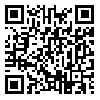دوره 12، شماره 1 - ( 12-1402 )
جلد 12 شماره 1 صفحات 26-17 |
برگشت به فهرست نسخه ها
Ethics code: IR.KUMS.50002754
Clinical trials code: NA
Download citation:
BibTeX | RIS | EndNote | Medlars | ProCite | Reference Manager | RefWorks
Send citation to:



BibTeX | RIS | EndNote | Medlars | ProCite | Reference Manager | RefWorks
Send citation to:
Rezaei S, Chehri A, Hosseini S S, Arefi M, Amiri H. Associations of Sleep Problems and Self-regulation With Interpersonal Aggression Among Healthcare Workers. Iran J Health Sci 2024; 12 (1) :17-26
URL: http://jhs.mazums.ac.ir/article-1-894-fa.html
URL: http://jhs.mazums.ac.ir/article-1-894-fa.html
رضائی شکیبا، چهری آزیتا، حسینی سعیده سادات، عارفی مختار، امیری حسن. Associations of Sleep Problems and Self-regulation With Interpersonal Aggression Among Healthcare Workers. علوم بهداشتی ایران. 1402; 12 (1) :17-26
، azitachehri@yahoo.com
چکیده: (2756 مشاهده)
Background and Purpose: Sleep problems and aggression are common among healthcare workers due to shift work and constant interaction with patients and their relatives. The present study examined the associations between sleep problems, self-regulation, and interpersonal aggression among healthcare workers.
Materials and Methods: In this cross-sectional study, 400 healthcare workers were selected from four state-run hospitals in Kermanshah City, Iran, using a multi-stage random sampling between March 2021 and March 2022. The sample size was selected using the N>50+8m standard formula. The participants completed several standard scales, including the Pittsburgh sleep quality index, the Berlin questionnaire, the insomnia severity index, the self-regulation questionnaire, and the Buss-Perry aggression questionnaire. The obtained data were analyzed using the Pearson correlation, hierarchical multiple regression techniques, and standardized z scores.
Results: The Mean±SD age of the participants was 32.5±8.8 years and 70% were female. All sleep problems, including poor sleep quality, sleep apnea, and insomnia severity, are significantly related to the total score of interpersonal aggression and all its subfactors (P<0.001). The results showed that adding self-regulation to sleep problems to predict aggression greatly reduces the effect of sleep problems, especially the insomnia severity (P<0.001).
Conclusion: The results showed that self-regulation is not only a protective factor for aggression but also indirectly protects against aggression by controlling the severity of insomnia. Because both sleep problems and self-dysregulation are modifiable risk factors for interpersonal aggression, psychological interventions can target these risk factors.
Materials and Methods: In this cross-sectional study, 400 healthcare workers were selected from four state-run hospitals in Kermanshah City, Iran, using a multi-stage random sampling between March 2021 and March 2022. The sample size was selected using the N>50+8m standard formula. The participants completed several standard scales, including the Pittsburgh sleep quality index, the Berlin questionnaire, the insomnia severity index, the self-regulation questionnaire, and the Buss-Perry aggression questionnaire. The obtained data were analyzed using the Pearson correlation, hierarchical multiple regression techniques, and standardized z scores.
Results: The Mean±SD age of the participants was 32.5±8.8 years and 70% were female. All sleep problems, including poor sleep quality, sleep apnea, and insomnia severity, are significantly related to the total score of interpersonal aggression and all its subfactors (P<0.001). The results showed that adding self-regulation to sleep problems to predict aggression greatly reduces the effect of sleep problems, especially the insomnia severity (P<0.001).
Conclusion: The results showed that self-regulation is not only a protective factor for aggression but also indirectly protects against aggression by controlling the severity of insomnia. Because both sleep problems and self-dysregulation are modifiable risk factors for interpersonal aggression, psychological interventions can target these risk factors.
نوع مطالعه: پژوهشي |
موضوع مقاله:
بهداشت حرفه ای
ارسال پیام به نویسنده مسئول
| بازنشر اطلاعات | |
 |
این مقاله تحت شرایط Creative Commons Attribution-NonCommercial 4.0 International License قابل بازنشر است. |








